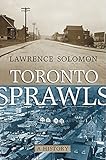Toronto Sprawls : A History / Lawrence Solomon.
Material type: TextSeries: U of T Centre for Public Management Series on Public Policy & AdministrationPublisher: Toronto : University of Toronto Press, [2007]Copyright date: ©2007Description: 1 online resource (128 p.)Content type:
TextSeries: U of T Centre for Public Management Series on Public Policy & AdministrationPublisher: Toronto : University of Toronto Press, [2007]Copyright date: ©2007Description: 1 online resource (128 p.)Content type: - 9780772786180
- 9781442685062
- 307.1/41609713541 22
- HT169.C32 T485 2007
- online - DeGruyter
| Item type | Current library | Call number | URL | Status | Notes | Barcode | |
|---|---|---|---|---|---|---|---|
 eBook
eBook
|
Biblioteca "Angelicum" Pont. Univ. S.Tommaso d'Aquino Nuvola online | online - DeGruyter (Browse shelf(Opens below)) | Online access | Not for loan (Accesso limitato) | Accesso per gli utenti autorizzati / Access for authorized users | (dgr)9781442685062 |
restricted access online access with authorization star
http://purl.org/coar/access_right/c_16ec
With a landmass of approximately 7000 square kilometres and a population of roughly five million, the Greater Toronto Area is Canada's largest metropolitan centre. How did a small nineteenth-century colonial capital become this sprawling urban giant, and how did government policies shape the contours of its landscape?In Toronto Sprawls, Lawrence Solomon examines the great migration from farms to the city that occurred in the last half of the nineteenth century. During this period, a disproportionate number of single women came to Toronto while, at the same time, immigration from abroad was swelling the city's urban boundaries. Labour unions were increasingly successful in recruiting urban workers in these years. Governments responded to these perceived threats with a series of policies designed to foster order. To promote single family dwellings conducive to the traditional family, buildings in high-density areas were razed and apartment buildings banned. To discourage returning First World War veterans from settling in cities, the government offered grants to spur rural settlement. These policies and others dispersed the city's population and promoted sprawl.An illuminating read, Toronto Sprawls makes a convincing case that urban sprawl in Toronto was caused not by market forces, but rather by policies and programs designed to disperse Toronto's urban population.
Mode of access: Internet via World Wide Web.
In English.
Description based on online resource; title from PDF title page (publisher's Web site, viewed 01. Nov 2023)


